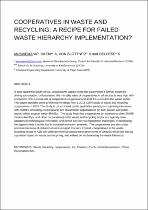 ResearchSpace
ResearchSpace
Cooperatives in waste and recycling: A recipe for failed waste hierarchy implementation?
JavaScript is disabled for your browser. Some features of this site may not work without it.
- ResearchSpace
- →
- Research Publications/Outputs
- →
- Conference Publications
- →
- View Item
| dc.contributor.author |
Muswema, Aubrey P

|
|
| dc.contributor.author |
Okem, A

|
|
| dc.contributor.author |
Blottnitz, H

|
|
| dc.contributor.author |
Oelofse, Suzanna HH

|
|
| dc.date.accessioned | 2018-12-03T12:50:25Z | |
| dc.date.available | 2018-12-03T12:50:25Z | |
| dc.date.issued | 2018-10 | |
| dc.identifier.citation | Muswema, A.P. et al. 2018. Cooperatives in waste and recycling: A recipe for failed waste hierarchy implementation? The 24th WasteCon Conference and Exhibition, 15-19th October 2018, Emperors Palace, Johannesburg, Gauteng | en_US |
| dc.identifier.uri | http://www.wastecon.co.za/programme.html | |
| dc.identifier.uri | http://hdl.handle.net/10204/10579 | |
| dc.description | Paper delivered during the 24th WasteCon Conference and Exhibition, 15-19th October 2018, Emperors Palace, Johannesburg, Gauteng | en_US |
| dc.description.abstract | In post-apartheid South Africa, cooperatives appear to be the government’s SMME model for driving job creation. Unfortunately, the mortality rates of cooperatives in all sectors is very high with a reported 12% survival rate of cooperatives in general and an 8.1% survival in the waste sector. This paper provides some preliminary findings from a 2016 CSIR study of waste and recycling cooperatives in KZN. The study is underpinned by the qualitative paradigm comprising interviews with SMMEs (including cooperatives) and stakeholder organisations (in both private and public sector) which support these SMMEs. The study finds that cooperatives (in contrast to other SMME models like Ptys, and close corporations) in the waste and recycling sector are typically slow adapters to technological innovation, and hence are likely to experience challenges in harnessing the opportunities that the fourth industrial revolution presents. The cooperatives are also under pressure because of reduced access to export markets. Overall, cooperatives in the waste recycling sector in KZN are underperforming compared to other forms of SMMEs which are having a positive impact on waste and recycling, and indeed on implementing the waste hierarchy. | en_US |
| dc.language.iso | en | en_US |
| dc.relation.ispartofseries | Worklist;21287 | |
| dc.subject | Waste hierarchy | en_US |
| dc.subject | Cooperatives | en_US |
| dc.subject | Job creation | en_US |
| dc.subject | Fourth industrial revolution | en_US |
| dc.subject | China recyclables ban | en_US |
| dc.title | Cooperatives in waste and recycling: A recipe for failed waste hierarchy implementation? | en_US |
| dc.type | Conference Presentation | en_US |
| dc.identifier.apacitation | Muswema, A. P., Okem, A., Blottnitz, H., & Oelofse, S. H. (2018). Cooperatives in waste and recycling: A recipe for failed waste hierarchy implementation?. http://hdl.handle.net/10204/10579 | en_ZA |
| dc.identifier.chicagocitation | Muswema, Aubrey P, A Okem, H Blottnitz, and Suzanna HH Oelofse. "Cooperatives in waste and recycling: A recipe for failed waste hierarchy implementation?." (2018): http://hdl.handle.net/10204/10579 | en_ZA |
| dc.identifier.vancouvercitation | Muswema AP, Okem A, Blottnitz H, Oelofse SH, Cooperatives in waste and recycling: A recipe for failed waste hierarchy implementation?; 2018. http://hdl.handle.net/10204/10579 . | en_ZA |
| dc.identifier.ris | TY - Conference Presentation AU - Muswema, Aubrey P AU - Okem, A AU - Blottnitz, H AU - Oelofse, Suzanna HH AB - In post-apartheid South Africa, cooperatives appear to be the government’s SMME model for driving job creation. Unfortunately, the mortality rates of cooperatives in all sectors is very high with a reported 12% survival rate of cooperatives in general and an 8.1% survival in the waste sector. This paper provides some preliminary findings from a 2016 CSIR study of waste and recycling cooperatives in KZN. The study is underpinned by the qualitative paradigm comprising interviews with SMMEs (including cooperatives) and stakeholder organisations (in both private and public sector) which support these SMMEs. The study finds that cooperatives (in contrast to other SMME models like Ptys, and close corporations) in the waste and recycling sector are typically slow adapters to technological innovation, and hence are likely to experience challenges in harnessing the opportunities that the fourth industrial revolution presents. The cooperatives are also under pressure because of reduced access to export markets. Overall, cooperatives in the waste recycling sector in KZN are underperforming compared to other forms of SMMEs which are having a positive impact on waste and recycling, and indeed on implementing the waste hierarchy. DA - 2018-10 DB - ResearchSpace DP - CSIR KW - Waste hierarchy KW - Cooperatives KW - Job creation KW - Fourth industrial revolution KW - China recyclables ban LK - https://researchspace.csir.co.za PY - 2018 T1 - Cooperatives in waste and recycling: A recipe for failed waste hierarchy implementation? TI - Cooperatives in waste and recycling: A recipe for failed waste hierarchy implementation? UR - http://hdl.handle.net/10204/10579 ER - | en_ZA |





